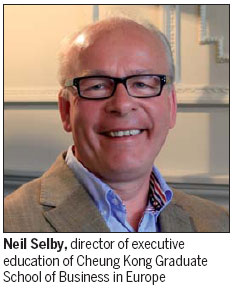Learning from each other's experience
Updated: 2013-05-24 09:10
By Cecily Liu (China Daily)
|
|||||||||||
|
A three-and-half-day executive program will be taught on the Lausanne campus of the Swiss business school IMD in September. Provided to China Daily |
Business school takes leading Chinese and Western experiences back to the classroom
A key barrier to business partnerships between Chinese and Western entrepreneurs is the differences that both parties perceive separate them, says Neil Selby. But he and his team have devised a pioneering strategy to deal with it.
"The big challenge about globalization is to get people to let go of their preconceptions," says Selby, director of executive education of Cheung Kong Graduate School of Business in Europe.
 |
"There may be certain differences in etiquettes of Eastern and Western business cultures, but fundamentally a lot of their values are the same."
Selby, who left his previous job as international director at Oxford Said Business School in November 2011 to help the Chinese business school launch its European operations, says the new experience has been a steep learning curve.
With Oliver Shiell, who also left Said to join CKGSB, Selby heads a new course, called the China Strategy Challenge, to bring together Chinese and European entrepreneurs to examine and deal with the preconceptions they have of one another.
"We ask the Chinese and European students to come up with preconceptions of each other, and then we bring the two groups together, and let them confront the preconception the other group came up with," Selby says.
"And it is quite a shock. And then from the shock, you then build. It's actually what eats away at the previous mindset you have. You probably have held that view for 20 years, and in the joint sessions you have something new."
The three-and-half-day executive program was first taught at Judge Business School in Cambridge in November. A similar course will take place on the Lausanne campus of the Swiss business school IMD in September.
After preconceptions are demolished in the initial confrontation, students are asked to look at case studies of Chinese and European businesses' interactions, and other more conventional course materials, Selby says.
"The new model entering into your head, you see how they are leveraged into other situations, and what worked and what didn't."
The program also attracts many thought leaders as students, which is less common in Western business schools, Shiell says.
The course in Cambridge in November attracted 30 European CEOs, including Sir Tom Hunter, once Scotland's richest man and a well-known philanthropist, and Lord Charles Aldington, former chairman of Deutsche Bank.
Shiell says Western business schools are founded on a tradition of educating mid-tier management people, typically those who have worked for a few years and want to gain a more holistic understanding of management theories before returning to the business world.
Chinese business schools have a tradition of educating thought leaders in society, he says, and he hopes CKGSB's entry into Europe will lead to a change there.
Today's Top News
List of approved GM food clarified
ID checks for express deliveries in Guangdong
Govt to expand elderly care
University asks freshmen to sign suicide disclaimer
Tibet gears up for new climbing season
Media asked to promote Sino-Indian ties
Shots fired at Washington Navy Yard
Minimum growth rate set at 7%
Hot Topics
Lunar probe , China growth forecasts, Emission rules get tougher, China seen through 'colored lens', International board,
Editor's Picks

|

|

|

|

|

|






